The Alliance for Higher Education in Prison is excited to announce that registration for the 15th National Conference on Higher Education in Prison is open! This in-person convening will take place in Cleveland, Ohio April 8–10, 2026.
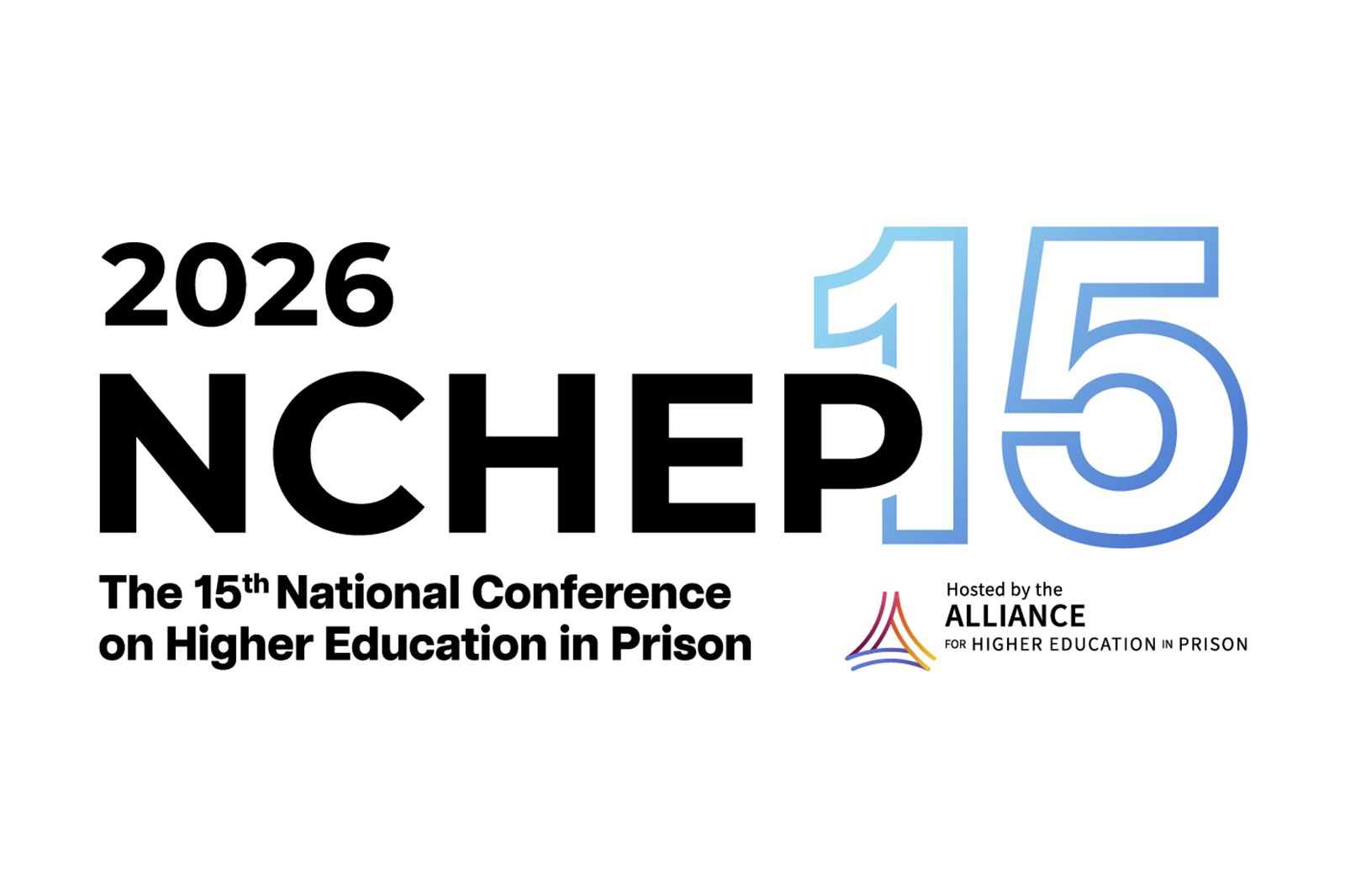
The Alliance for Higher Education in Prison is excited to announce that registration for the 15th National Conference on Higher Education in Prison is open! This in-person convening will take place in Cleveland, Ohio April 8–10, 2026.


Psychologists are teaching in-prison college programs and finding renewed purpose in their work.

Psychologists are teaching in-prison college programs and finding renewed purpose in their work.

The higher education landscape in the United States mirrors broader societal inequalities experienced by formerly incarcerated people seeking access to colleges and universities. This conceptual paper employs Ray’s theory of racialized organizations to explore how structural barriers faced by formerly incarcerated students, with a particular focus on Black men, who are disproportionately represented in both the criminal justice and higher education systems. We conclude with implications for institutional accountability and offer recommendations to support this population as we argue that without substantial shifts in policies and practices, higher education institutions will continue to perpetuate barriers rather than offer a second chance for formerly incarcerated Black men.

The higher education landscape in the United States mirrors broader societal inequalities experienced by formerly incarcerated people seeking access to colleges and universities. This conceptual paper employs Ray’s theory of racialized organizations to explore how structural barriers faced by formerly incarcerated students, with a particular focus on Black men, who are disproportionately represented in both the criminal justice and higher education systems. We conclude with implications for institutional accountability and offer recommendations to support this population as we argue that without substantial shifts in policies and practices, higher education institutions will continue to perpetuate barriers rather than offer a second chance for formerly incarcerated Black men.

The collection will bring together a mix of research-informed, practice-based, reflective, collaborative, and narrative contributions. Alongside theoretical and research-informed chapters, we actively encourage more informal pieces, such as personal reflections on using library services while incarcerated or on delivering library and reading initiatives. International contributions are welcomed to enable sharing of practice across correctional systems and cultural contexts. Rather than assuming a single model of library practice or training, the book starts from the premise that provision of libraries and reading initiatives vary widely across prison systems and cultures, and that these differences offer important opportunities for mutual learning. This book is being proposed for publication as part of Routledge’s Critical Issues in Library and Information Sciences and Services series.

The collection will bring together a mix of research-informed, practice-based, reflective, collaborative, and narrative contributions. Alongside theoretical and research-informed chapters, we actively encourage more informal pieces, such as personal reflections on using library services while incarcerated or on delivering library and reading initiatives. International contributions are welcomed to enable sharing of practice across correctional systems and cultural contexts. Rather than assuming a single model of library practice or training, the book starts from the premise that provision of libraries and reading initiatives vary widely across prison systems and cultures, and that these differences offer important opportunities for mutual learning. This book is being proposed for publication as part of Routledge’s Critical Issues in Library and Information Sciences and Services series.
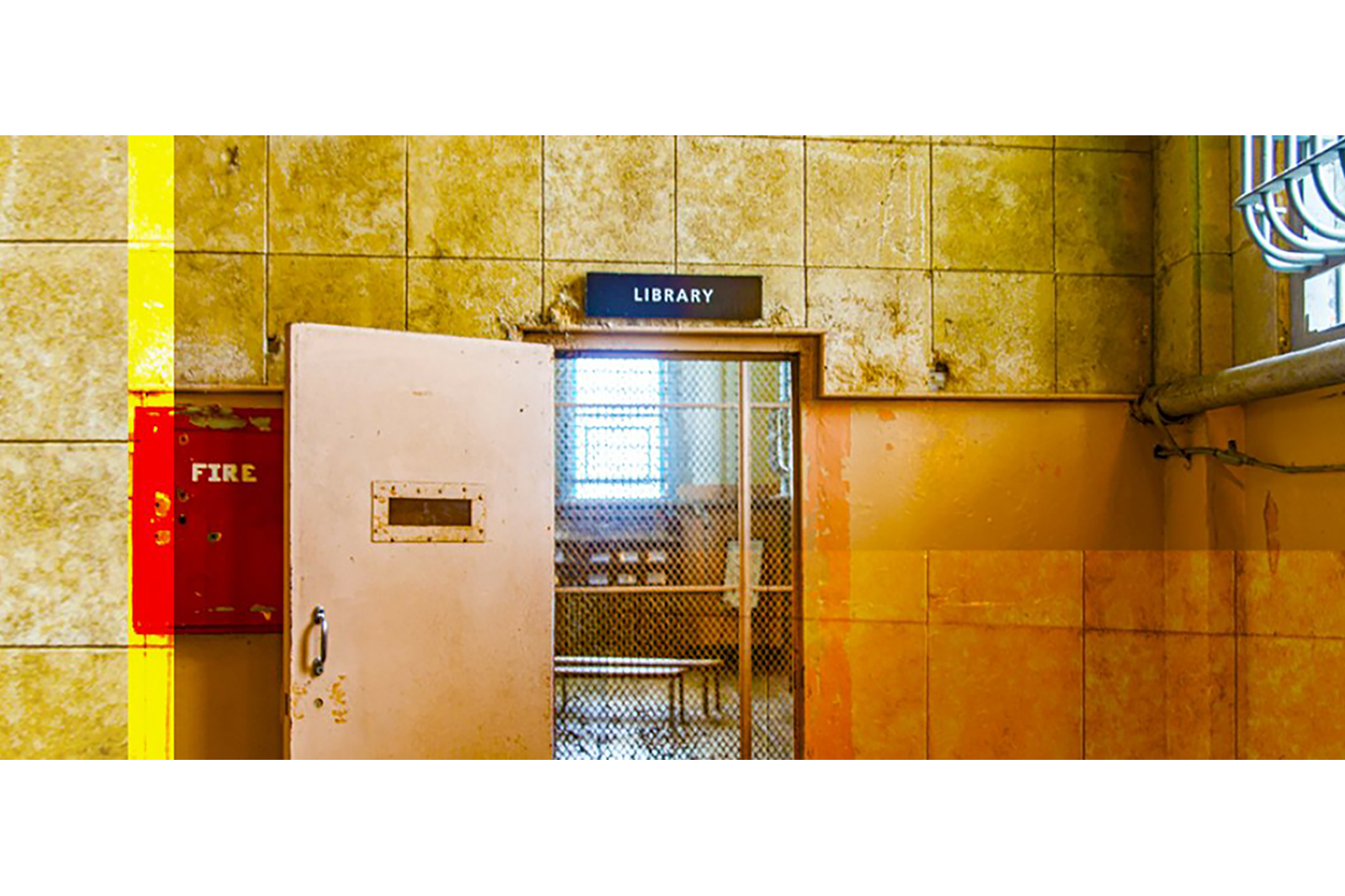
Why bother? What’s the point? These are questions that inevitably arise in conversations about college programs in prisons. But these questions make certain assumptions about education in general and higher education in prisons specifically. What is it, exactly, that is not worth it, according to skeptics and naysayers, about college education in prison? Ought we not to consider just what the point of education is in the first place? My position as a prisoner has given me the opportunity to contemplate the question and arrive at some insight into it.

Why bother? What’s the point? These are questions that inevitably arise in conversations about college programs in prisons. But these questions make certain assumptions about education in general and higher education in prisons specifically. What is it, exactly, that is not worth it, according to skeptics and naysayers, about college education in prison? Ought we not to consider just what the point of education is in the first place? My position as a prisoner has given me the opportunity to contemplate the question and arrive at some insight into it.

The first time I enrolled in college was in 2004 when a local private college offered classes at Greene Correctional Facility. I was 17 years old and I was only able to to complete two college classes before the college lost funding to run the program. Like many other incarcerated college students in New York, the loss of Pell and TAP grants for people in prison interrupted my educational journey. And unfortunately, it would take more than six credits for me to transform my life.

The first time I enrolled in college was in 2004 when a local private college offered classes at Greene Correctional Facility. I was 17 years old and I was only able to to complete two college classes before the college lost funding to run the program. Like many other incarcerated college students in New York, the loss of Pell and TAP grants for people in prison interrupted my educational journey. And unfortunately, it would take more than six credits for me to transform my life.
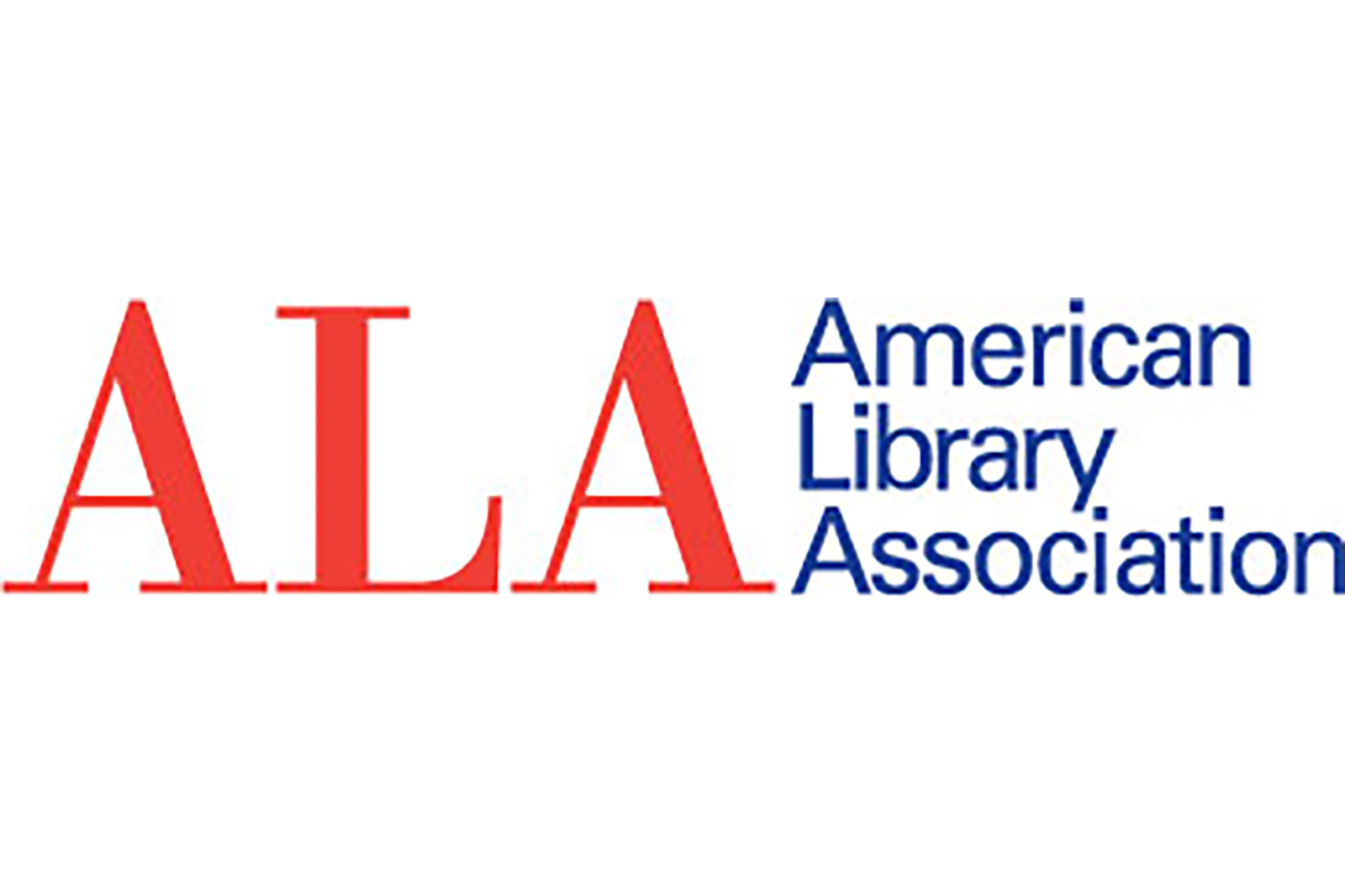
The American Library Association praised the Prison Libraries Act, introduced in January by Rep. Emanuel Cleaver II (D-MO-5), along with co-leads Rep. Shontel Brown (D-OH-11), and Rep. Valerie Foushee (D-NC-4). The bill would establish a grant program within the Department of Justice to provide library services to incarcerated individuals to advance reintegration efforts, reduce recidivism and increase educational opportunities.

The American Library Association praised the Prison Libraries Act, introduced in January by Rep. Emanuel Cleaver II (D-MO-5), along with co-leads Rep. Shontel Brown (D-OH-11), and Rep. Valerie Foushee (D-NC-4). The bill would establish a grant program within the Department of Justice to provide library services to incarcerated individuals to advance reintegration efforts, reduce recidivism and increase educational opportunities.
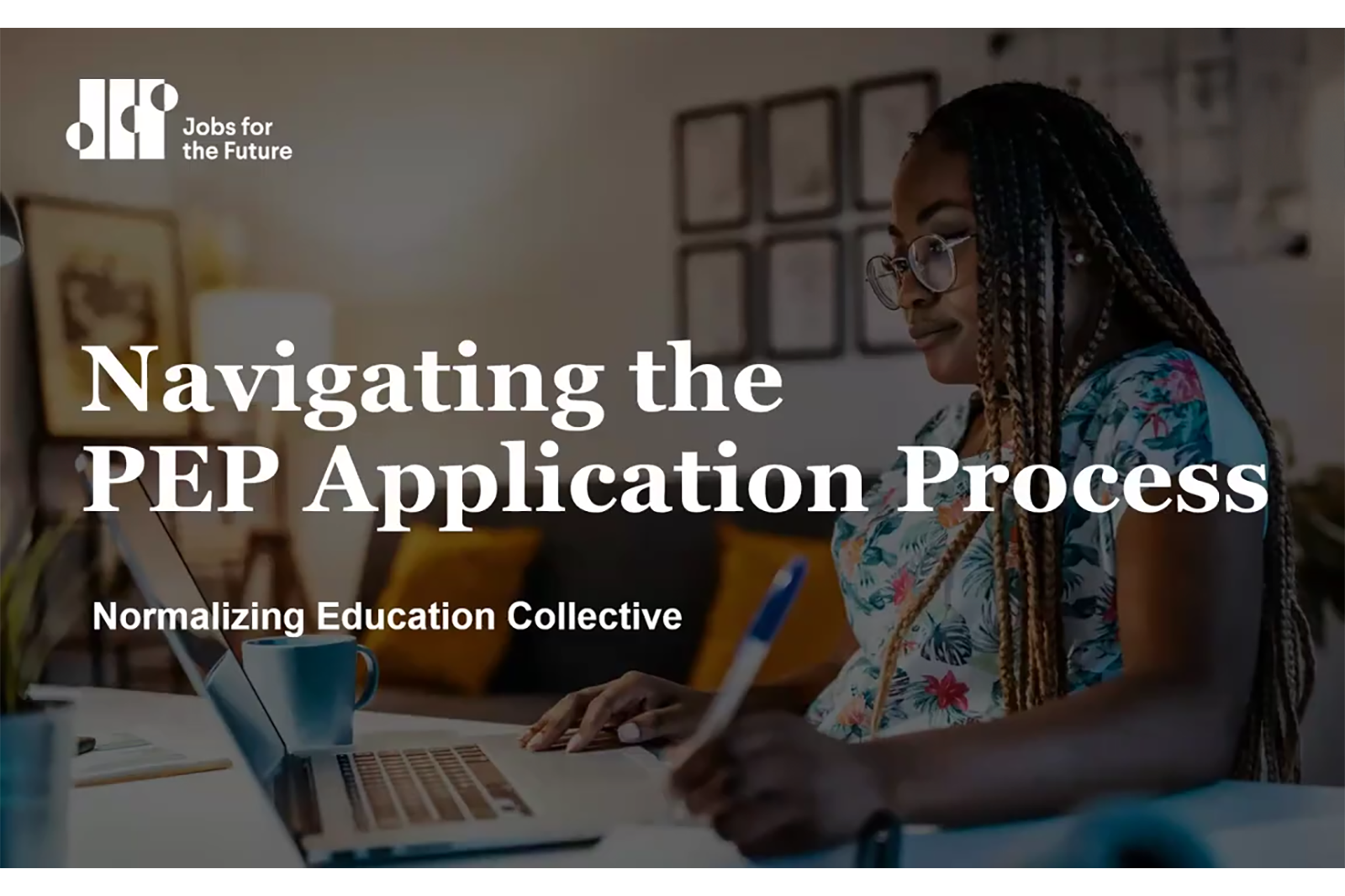
The recording is available from JFF's December 16, 2025, virtual learning session with Ashley Shuler and Sean Addie from the U.S. Department of Education, Sheila Meiman from NASFAA, Stephanie Gaskill from Loyola University, and Katie Dwyer from Chemeketa Community College, institutional leaders who recently navigated the PEP application process.

The recording is available from JFF's December 16, 2025, virtual learning session with Ashley Shuler and Sean Addie from the U.S. Department of Education, Sheila Meiman from NASFAA, Stephanie Gaskill from Loyola University, and Katie Dwyer from Chemeketa Community College, institutional leaders who recently navigated the PEP application process.
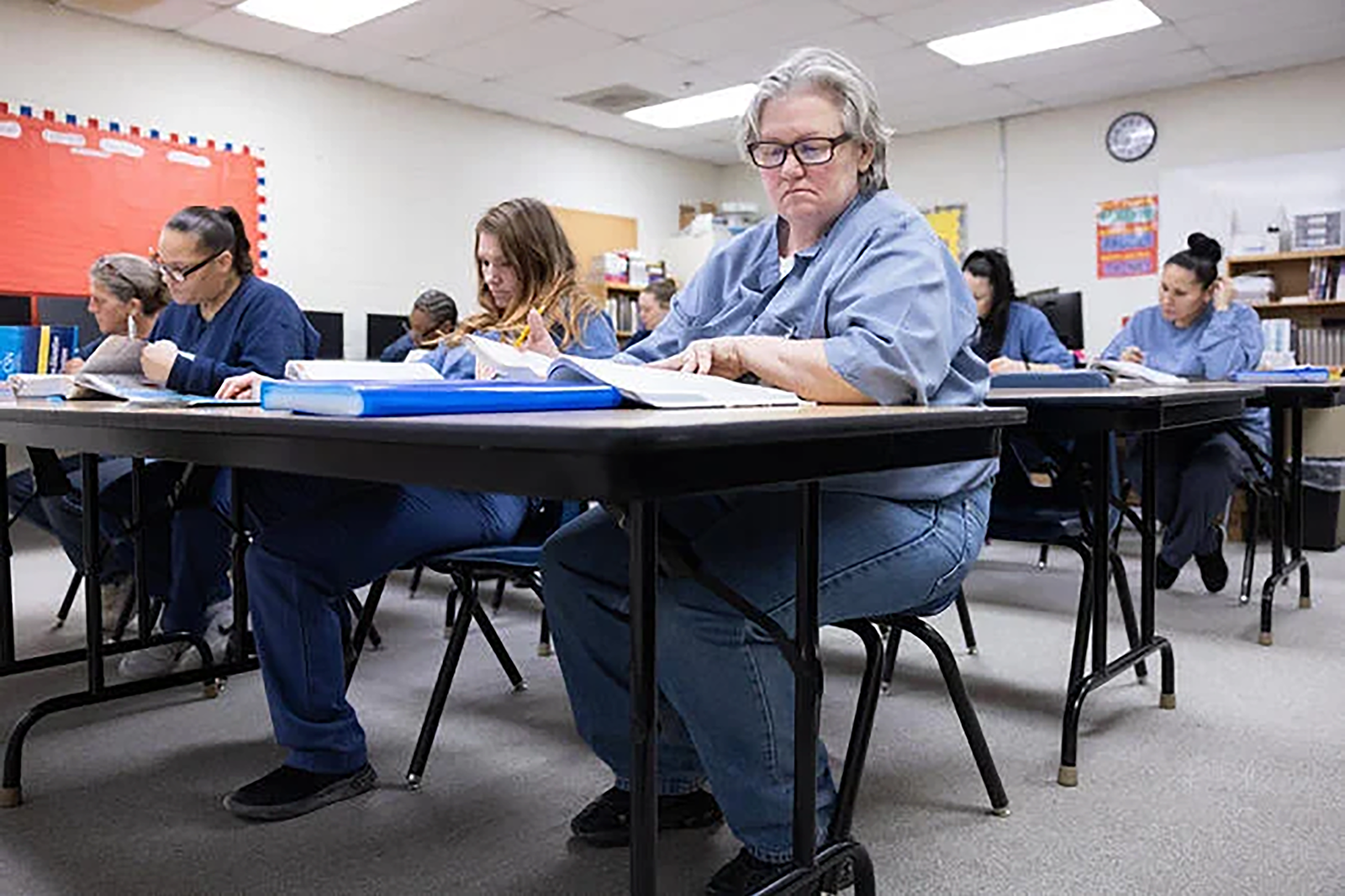
On January 12th, Inside Higher Ed published the article, “Prison Education May Raise Risk of Reincarceration” (subsequently changed to “Prison Education May Raise Risk of Reincarceration for Technical Violations”). The same day, we published a public statement expressing our concerns with the misleading and sensationalizing title of the article as well as some of the framework and conclusions of the cited study. On January 23rd, they published our longer Letter to the Editor.

On January 12th, Inside Higher Ed published the article, “Prison Education May Raise Risk of Reincarceration” (subsequently changed to “Prison Education May Raise Risk of Reincarceration for Technical Violations”). The same day, we published a public statement expressing our concerns with the misleading and sensationalizing title of the article as well as some of the framework and conclusions of the cited study. On January 23rd, they published our longer Letter to the Editor.

In today’s technology-driven world, digital literacy isn’t just a skill—it’s a lifeline. For individuals who are incarcerated, the ability to effectively use digital tools can mean the difference between returning to the community prepared or being left even further behind. In applied research, RTI International and Ithaka S+R have demonstrated that providing quality access to technology in prisons and jails is a key step in preparing individuals who are incarcerated for life after release. This blog post highlights the urgency of developing digital skills as well as some promising practices and strategies for doing so.

In today’s technology-driven world, digital literacy isn’t just a skill—it’s a lifeline. For individuals who are incarcerated, the ability to effectively use digital tools can mean the difference between returning to the community prepared or being left even further behind. In applied research, RTI International and Ithaka S+R have demonstrated that providing quality access to technology in prisons and jails is a key step in preparing individuals who are incarcerated for life after release. This blog post highlights the urgency of developing digital skills as well as some promising practices and strategies for doing so.
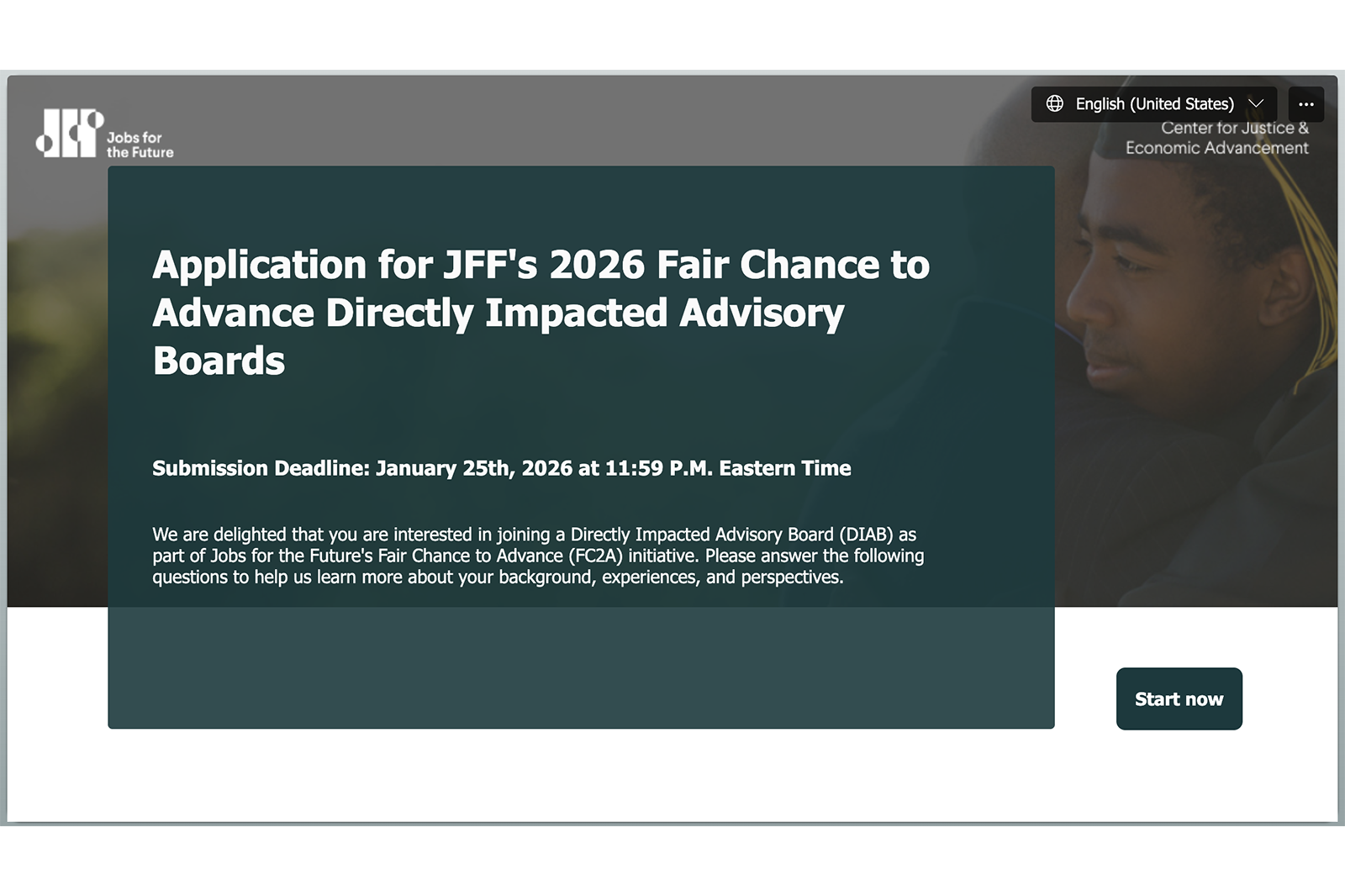
Jobs for the Future (JFF)’s Fair Chance to Advance (FC2A) initiative strengthens statewide education-to-employment pathways for people impacted by incarceration. A core strategy of FC2A is JFF’s support for State Action Networks in four states—Kansas, Maine, North Carolina, and Oregon. The Directly Impacted Advisory Board (DIAB) is a required component of each FC2A State Action Network. DIAB members bring lived experience and professional expertise to serve as trusted advisors to state agency leaders and network partners. Through this role, members help shape network strategies, policy priorities, and coordinated action plans, ensuring systems change efforts are informed by—and accountable to—the real-world experiences of people directly impacted by incarceration.

Jobs for the Future (JFF)’s Fair Chance to Advance (FC2A) initiative strengthens statewide education-to-employment pathways for people impacted by incarceration. A core strategy of FC2A is JFF’s support for State Action Networks in four states—Kansas, Maine, North Carolina, and Oregon. The Directly Impacted Advisory Board (DIAB) is a required component of each FC2A State Action Network. DIAB members bring lived experience and professional expertise to serve as trusted advisors to state agency leaders and network partners. Through this role, members help shape network strategies, policy priorities, and coordinated action plans, ensuring systems change efforts are informed by—and accountable to—the real-world experiences of people directly impacted by incarceration.

Kansas, Maine, North Carolina, and Oregon will receive up to $2.1M in funding through Jobs for the Future initiative to increase access to education and training in correctional facilities.

Kansas, Maine, North Carolina, and Oregon will receive up to $2.1M in funding through Jobs for the Future initiative to increase access to education and training in correctional facilities.

On January 12th, Inside Higher Ed published the article, “Prison Education May Raise Risk of Reincarceration” (subsequently changed to “Prison Education May Raise Risk of Reincarceration for Technical Violations”). The same day, we published this public statement expressing our concerns with the misleading and sensationalizing title of the article as well as some of the framework and conclusions of the cited study.

On January 12th, Inside Higher Ed published the article, “Prison Education May Raise Risk of Reincarceration” (subsequently changed to “Prison Education May Raise Risk of Reincarceration for Technical Violations”). The same day, we published this public statement expressing our concerns with the misleading and sensationalizing title of the article as well as some of the framework and conclusions of the cited study.
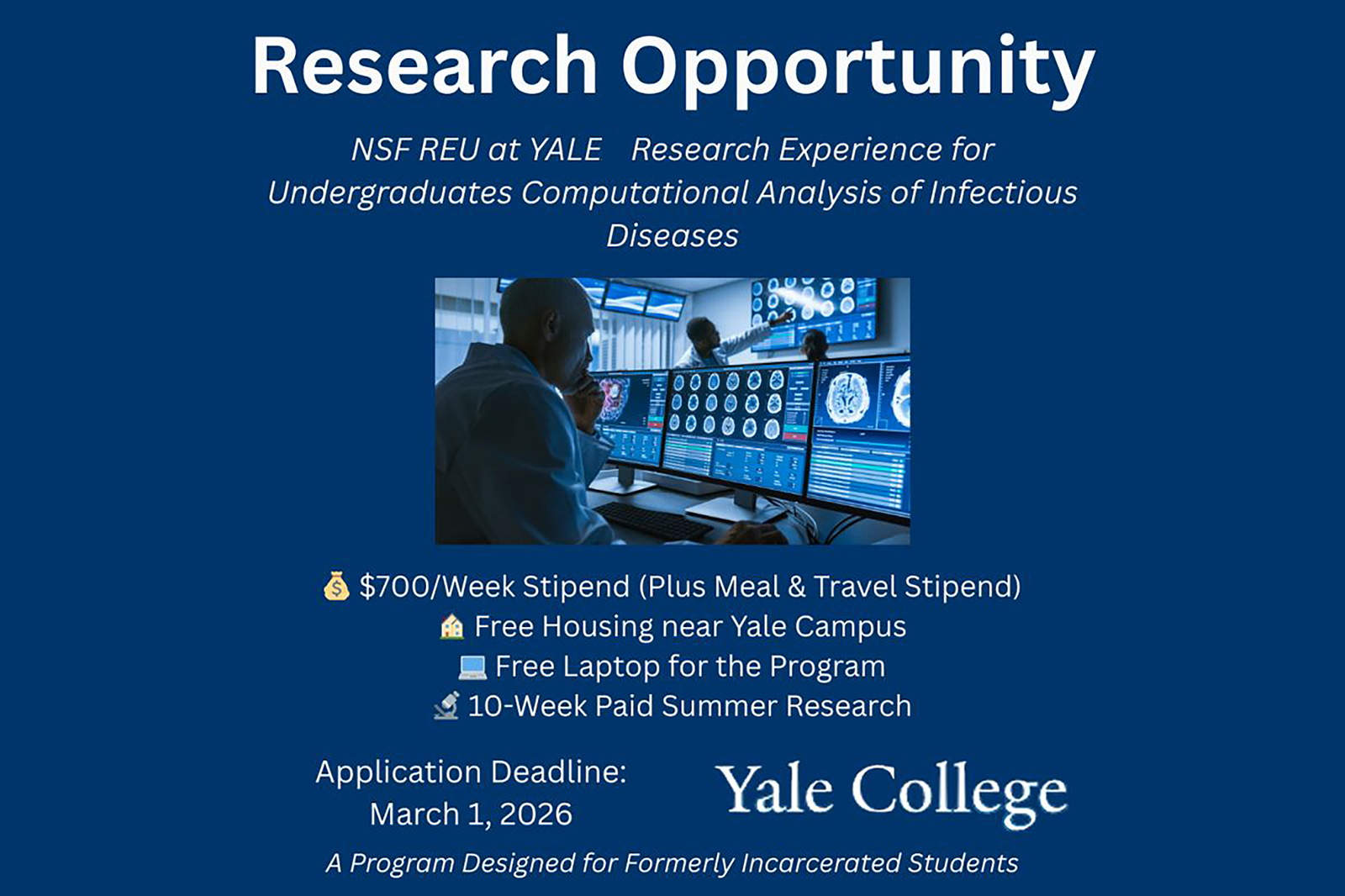
The NSF Research Experience for Undergraduates (REU) is offering a fully-funded 10-week program in Computational Analysis of Infectious Diseases, which is designed specifically for formerly incarcerated undergrads and community college students. This includes: $700/week + meal & travel stipends, free housing near Yale, a free laptop for your research, and faculty mentorship and graduate student guidance. Deadline: March 1, 2026.

The NSF Research Experience for Undergraduates (REU) is offering a fully-funded 10-week program in Computational Analysis of Infectious Diseases, which is designed specifically for formerly incarcerated undergrads and community college students. This includes: $700/week + meal & travel stipends, free housing near Yale, a free laptop for your research, and faculty mentorship and graduate student guidance. Deadline: March 1, 2026.
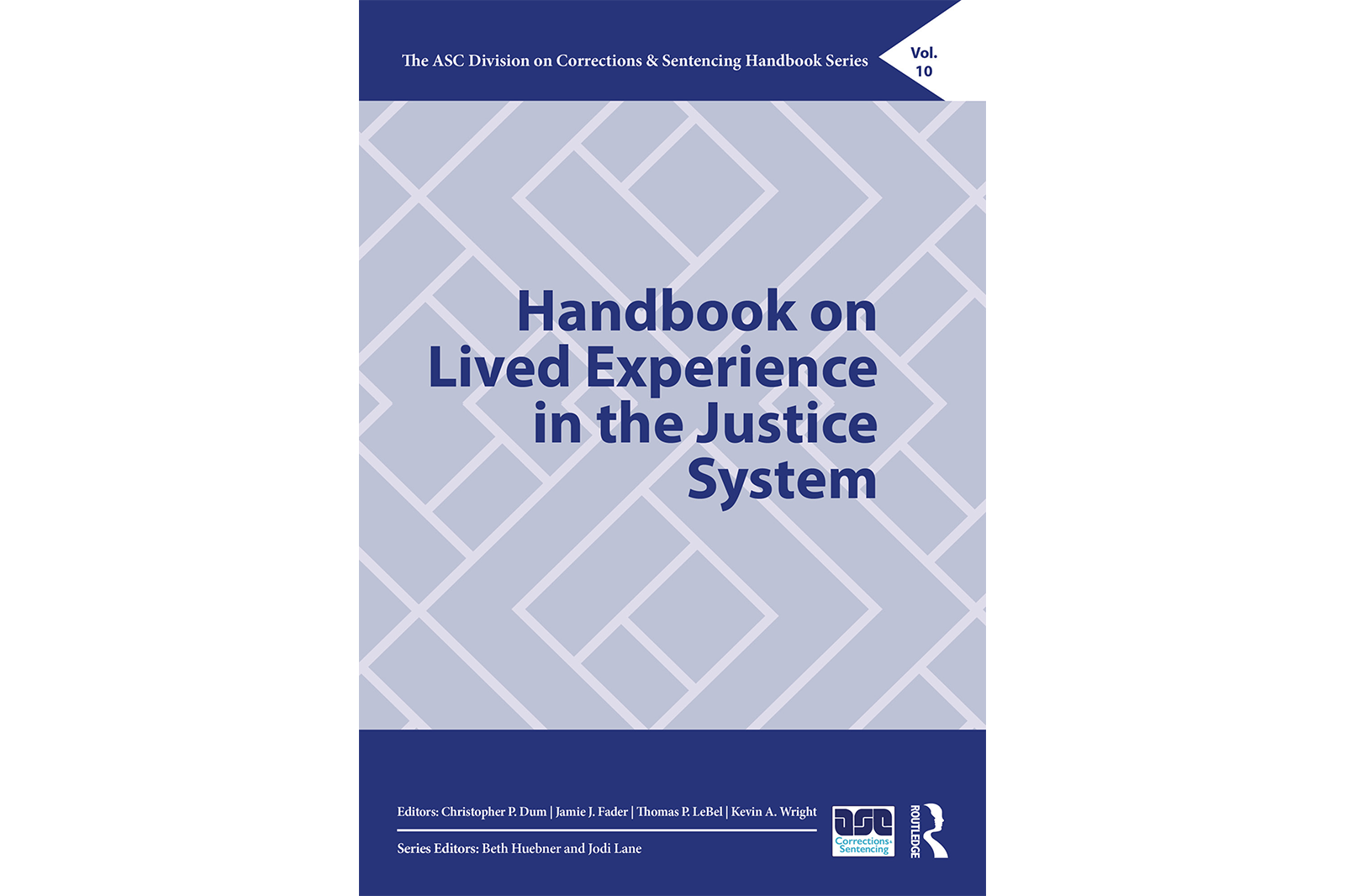
This volume offers a diverse set of scholarly essays on the imaginative potential of corrections and sentencing research/practice that centers on the lived experience of the criminal legal system. The volume includes 60 chapters written by academics, practitioners, and lived experts who are currently or formerly system-impacted. This groundbreaking and thought-provoking Handbook will appeal to academics, practitioners, policymakers, advocates, and students seeking to understand the many ways in which corrections and sentencing directly or indirectly affect a person’s daily life.

This volume offers a diverse set of scholarly essays on the imaginative potential of corrections and sentencing research/practice that centers on the lived experience of the criminal legal system. The volume includes 60 chapters written by academics, practitioners, and lived experts who are currently or formerly system-impacted. This groundbreaking and thought-provoking Handbook will appeal to academics, practitioners, policymakers, advocates, and students seeking to understand the many ways in which corrections and sentencing directly or indirectly affect a person’s daily life.

Around 50 incarcerated women have earned degrees from Marian University since 2019.

Around 50 incarcerated women have earned degrees from Marian University since 2019.
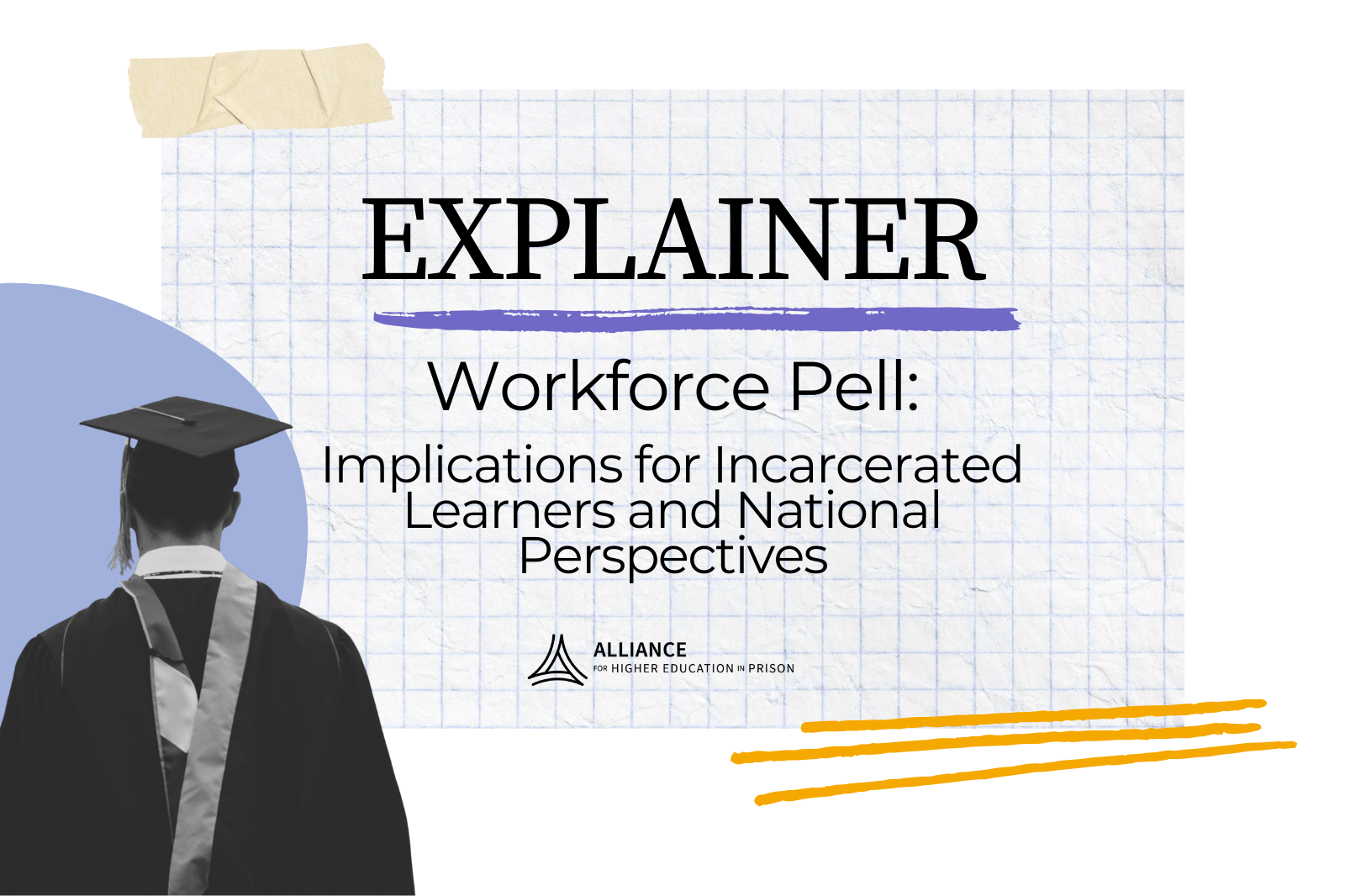
Workforce Pell is an initiative established by the One Big Beautiful Bill Act (OBBBA) that marks a significant change in federal financial aid policy and is set to be implemented July 1, 2026. This Explainer synthesizes existing public information and stakeholder perspectives on the initiative to provide an overview of the evolving landscape of this funding in the context of its implications for the field of higher education in prison.

Workforce Pell is an initiative established by the One Big Beautiful Bill Act (OBBBA) that marks a significant change in federal financial aid policy and is set to be implemented July 1, 2026. This Explainer synthesizes existing public information and stakeholder perspectives on the initiative to provide an overview of the evolving landscape of this funding in the context of its implications for the field of higher education in prison.

JFF’s Center for Justice & Economic Advancement is accepting applications for its 2026 Fair Chance to Advance Fellows program, a professional development opportunity for leaders with records of arrest, conviction, or incarceration in the U.S.

JFF’s Center for Justice & Economic Advancement is accepting applications for its 2026 Fair Chance to Advance Fellows program, a professional development opportunity for leaders with records of arrest, conviction, or incarceration in the U.S.

PEN America’s Incarcerated Writers Bureau (IWB) connects authors and audiences across carceral walls. The IWB was developed to showcase the literary talent of incarcerated writers in the United States, and to equip publishing professionals, agents, journalists, and advocacy organizations with the tools and information to work across prison walls.

PEN America’s Incarcerated Writers Bureau (IWB) connects authors and audiences across carceral walls. The IWB was developed to showcase the literary talent of incarcerated writers in the United States, and to equip publishing professionals, agents, journalists, and advocacy organizations with the tools and information to work across prison walls.

This report, completed in partnership between the American Institutes of Research and the Alliance for Higher Education, presents the findings of an exploratory study and national scan of state laws, policies, and practices related to work-based learning (WBL) in prisons. It identifies cross-cutting themes, gaps in policy and practice, and recommendations for strengthening WBL across prison settings.

This report, completed in partnership between the American Institutes of Research and the Alliance for Higher Education, presents the findings of an exploratory study and national scan of state laws, policies, and practices related to work-based learning (WBL) in prisons. It identifies cross-cutting themes, gaps in policy and practice, and recommendations for strengthening WBL across prison settings.
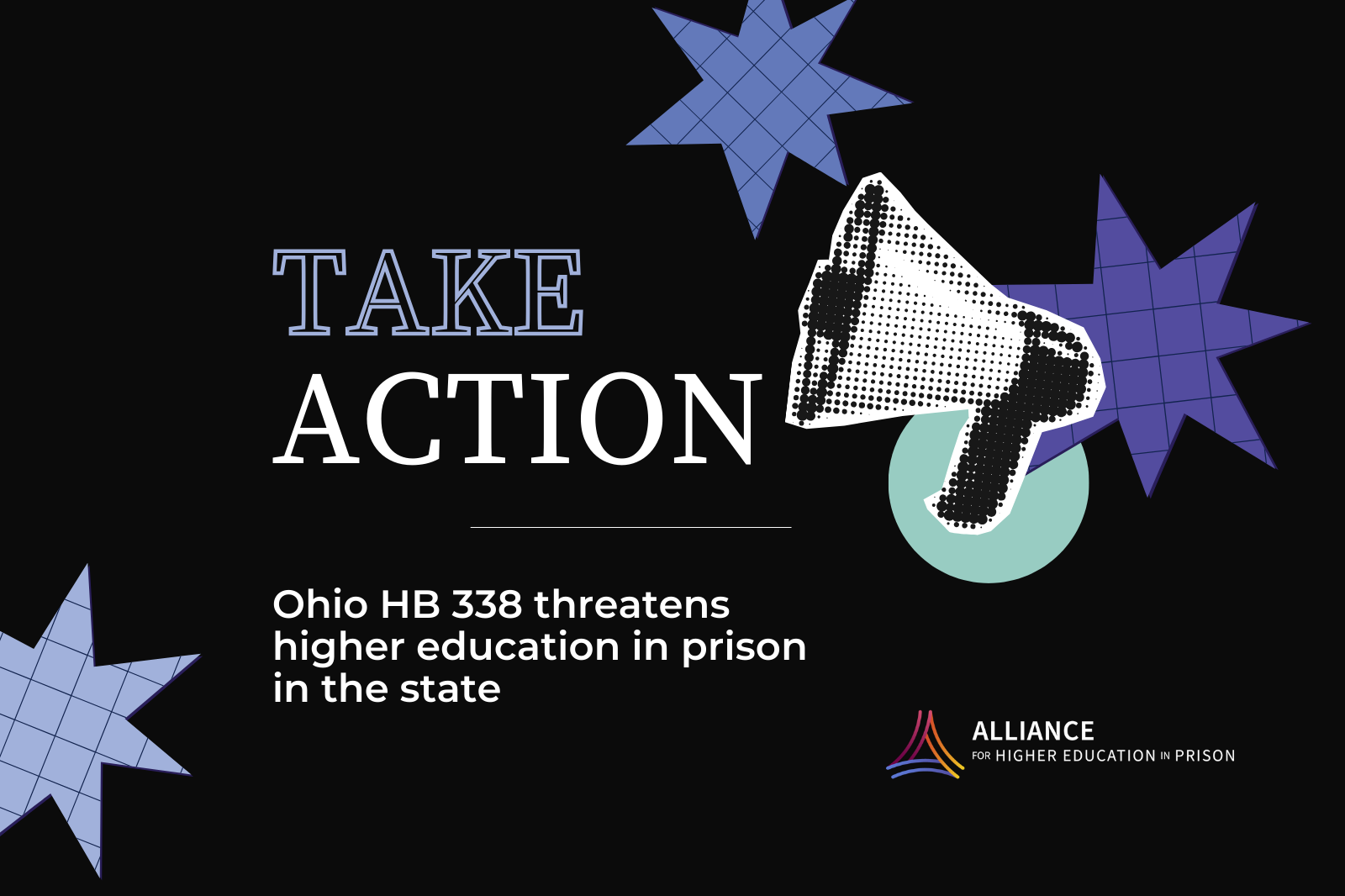
The Alliance for Higher Education in Prison is deeply concerned about the proposed language in Substitute House Bill 338, which would significantly limit educational opportunities for people who are incarcerated in Ohio. In response, we sent a letter to Ohio state legislators outlining our concerns and urging reconsideration. We encourage those who live and/or work in Ohio to make their voices heard ASAP!

The Alliance for Higher Education in Prison is deeply concerned about the proposed language in Substitute House Bill 338, which would significantly limit educational opportunities for people who are incarcerated in Ohio. In response, we sent a letter to Ohio state legislators outlining our concerns and urging reconsideration. We encourage those who live and/or work in Ohio to make their voices heard ASAP!
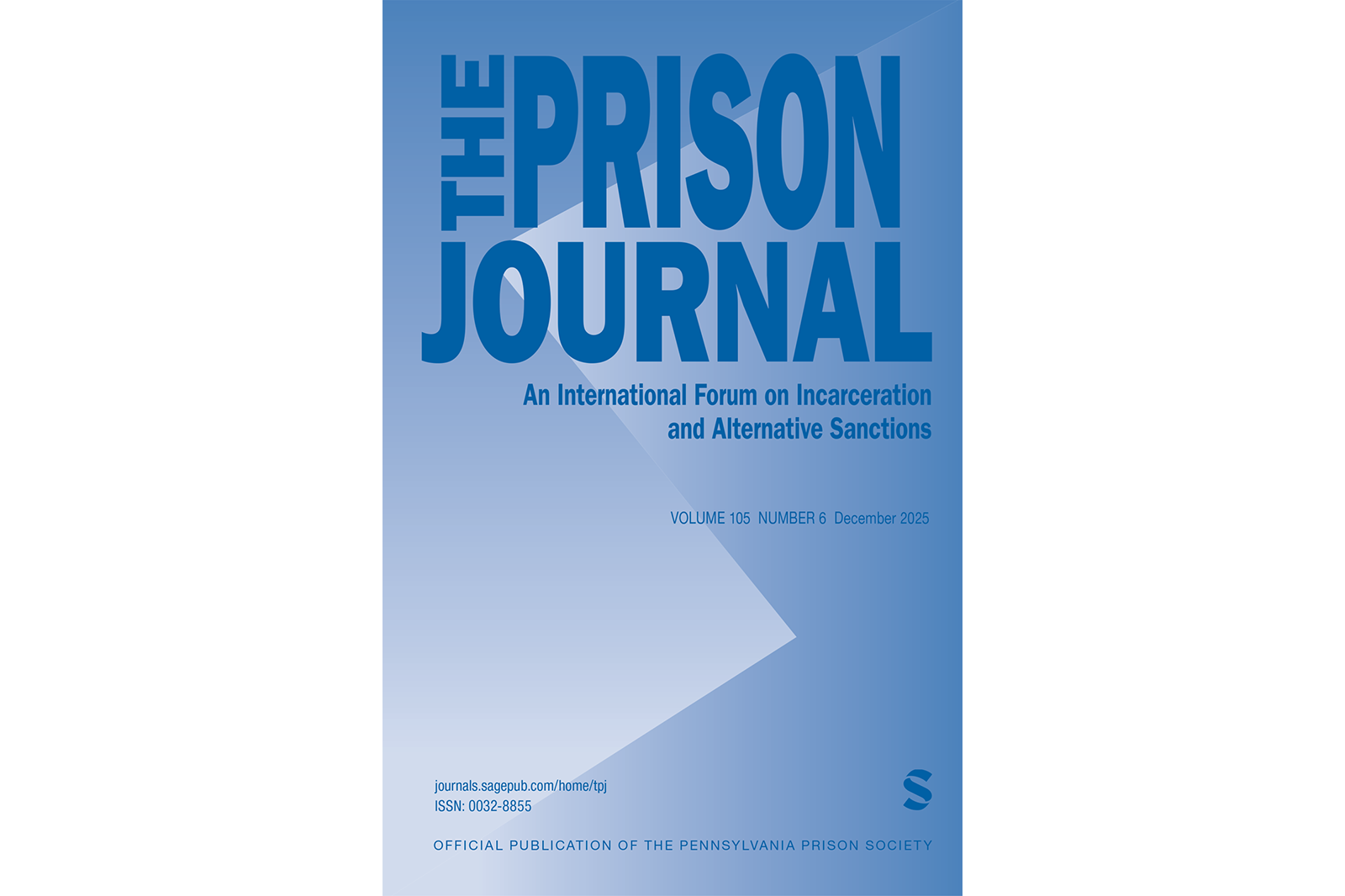
Abstract: The recent expansion of higher education programming in prison risks increasing inequality for disabled students who lack equitable access to these opportunities. Through a cumulative (dis)advantage framework, we describe existing educational pathway barriers to postsecondary education for incarcerated individuals with disabilities, demonstrating disability-related inequality in access to, and benefits from, prison education. Accordingly, we present a preliminary model of systemic improvements—Disability Identification, Integration, and Inclusion (DI3). The model provides a foundation for policy and practice recommendations to create equitable pathways to postsecondary education for individuals with disabilities in correctional settings.

Abstract: The recent expansion of higher education programming in prison risks increasing inequality for disabled students who lack equitable access to these opportunities. Through a cumulative (dis)advantage framework, we describe existing educational pathway barriers to postsecondary education for incarcerated individuals with disabilities, demonstrating disability-related inequality in access to, and benefits from, prison education. Accordingly, we present a preliminary model of systemic improvements—Disability Identification, Integration, and Inclusion (DI3). The model provides a foundation for policy and practice recommendations to create equitable pathways to postsecondary education for individuals with disabilities in correctional settings.
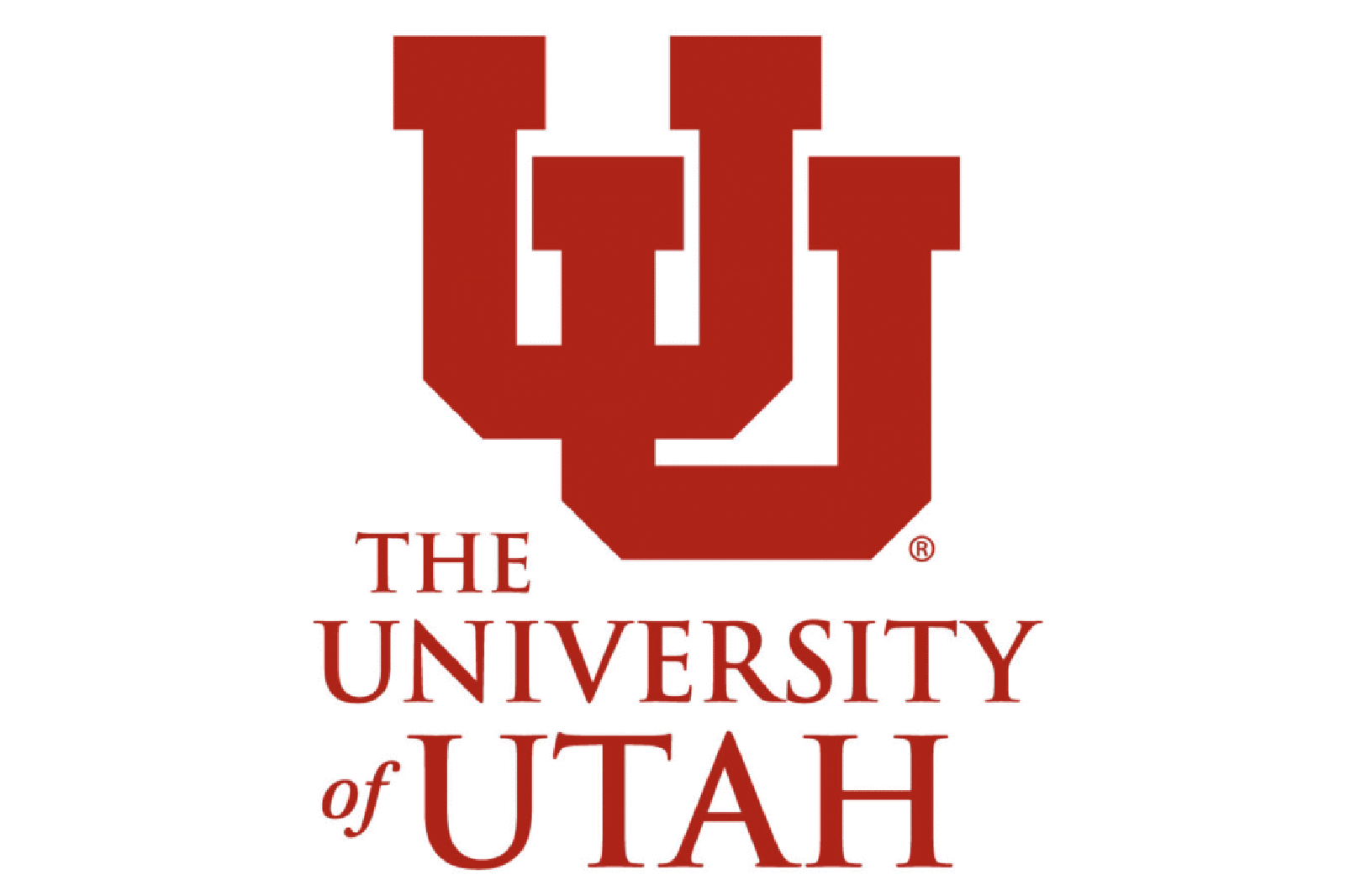
University of Utah education researchers have been awarded $8 million to launch the first national center dedicated to prison education research and leadership. A team led by Erin Castro, an associate professor of educational leadership and policy, will use the grant to establish the Prison Education Action Research Lab, or PEARL, to advance educational justice for people and communities impacted by incarceration. The lab will serve as a vital resource in a growing field in need of the next generation of researchers, leaders and practitioners focused on prison education.

University of Utah education researchers have been awarded $8 million to launch the first national center dedicated to prison education research and leadership. A team led by Erin Castro, an associate professor of educational leadership and policy, will use the grant to establish the Prison Education Action Research Lab, or PEARL, to advance educational justice for people and communities impacted by incarceration. The lab will serve as a vital resource in a growing field in need of the next generation of researchers, leaders and practitioners focused on prison education.

MDRC drew on existing research to identify opportunities to build more evidence about best practices to assist students who are pursuing higher education in prison and after release. To inform a research agenda that would be useful to program practitioners, policymakers, researchers, and students, the research team had several dozen conversations with college program staff members, college administrators, academic researchers, state officials, people working to assist individuals while incarcerated or who have recently been released, and students. This brief offers insights and recommendations from conversations with students and the staff members who work closest to them to inform more responsive research efforts on higher education for students who are incarcerated or have recently been released.

MDRC drew on existing research to identify opportunities to build more evidence about best practices to assist students who are pursuing higher education in prison and after release. To inform a research agenda that would be useful to program practitioners, policymakers, researchers, and students, the research team had several dozen conversations with college program staff members, college administrators, academic researchers, state officials, people working to assist individuals while incarcerated or who have recently been released, and students. This brief offers insights and recommendations from conversations with students and the staff members who work closest to them to inform more responsive research efforts on higher education for students who are incarcerated or have recently been released.
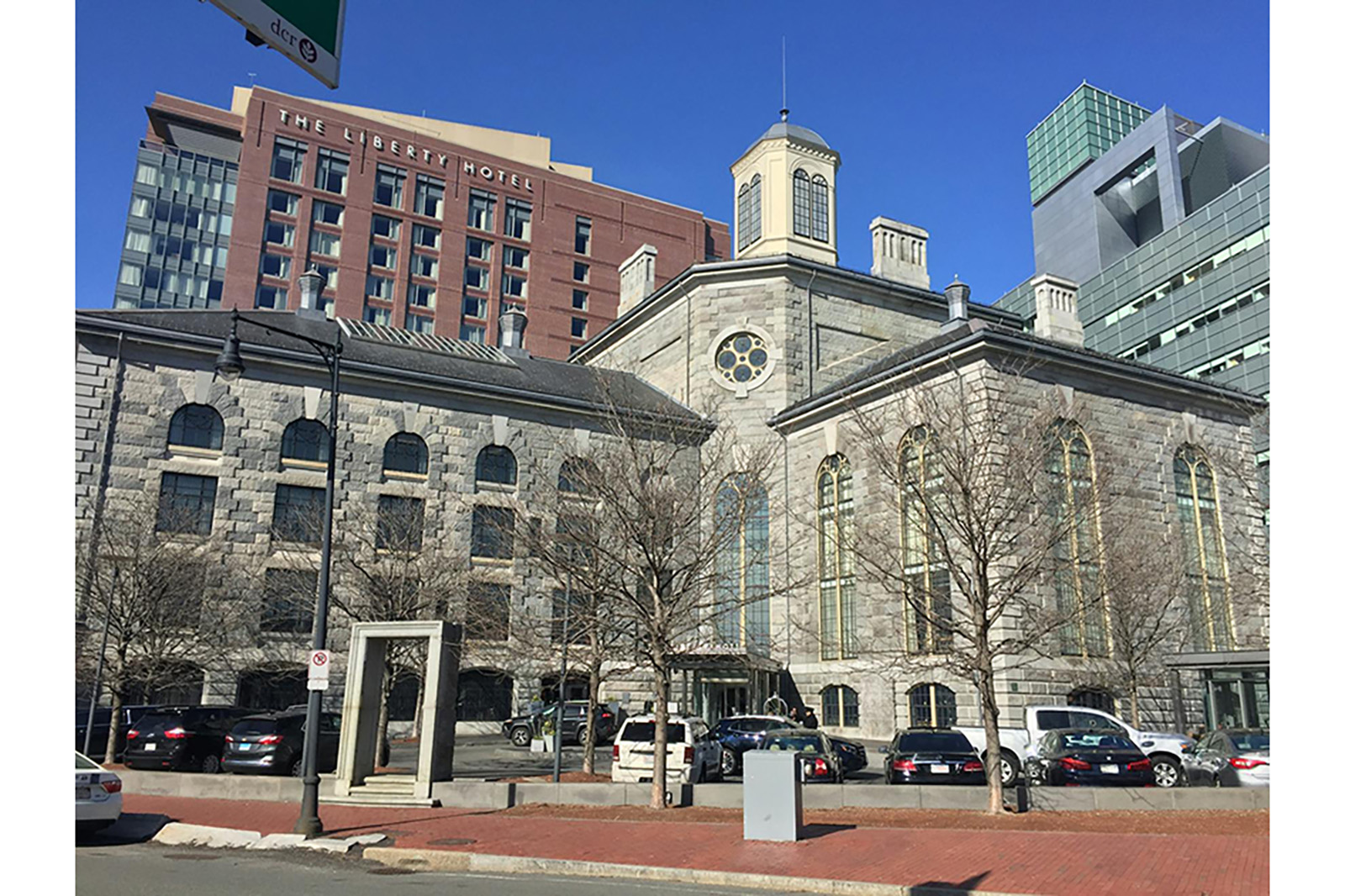
Brandeis Prof. David Sherman (ENG) talked about his experiences teaching English literature to incarcerated individuals in Boston and his mission to give everybody a second chance.

Brandeis Prof. David Sherman (ENG) talked about his experiences teaching English literature to incarcerated individuals in Boston and his mission to give everybody a second chance.
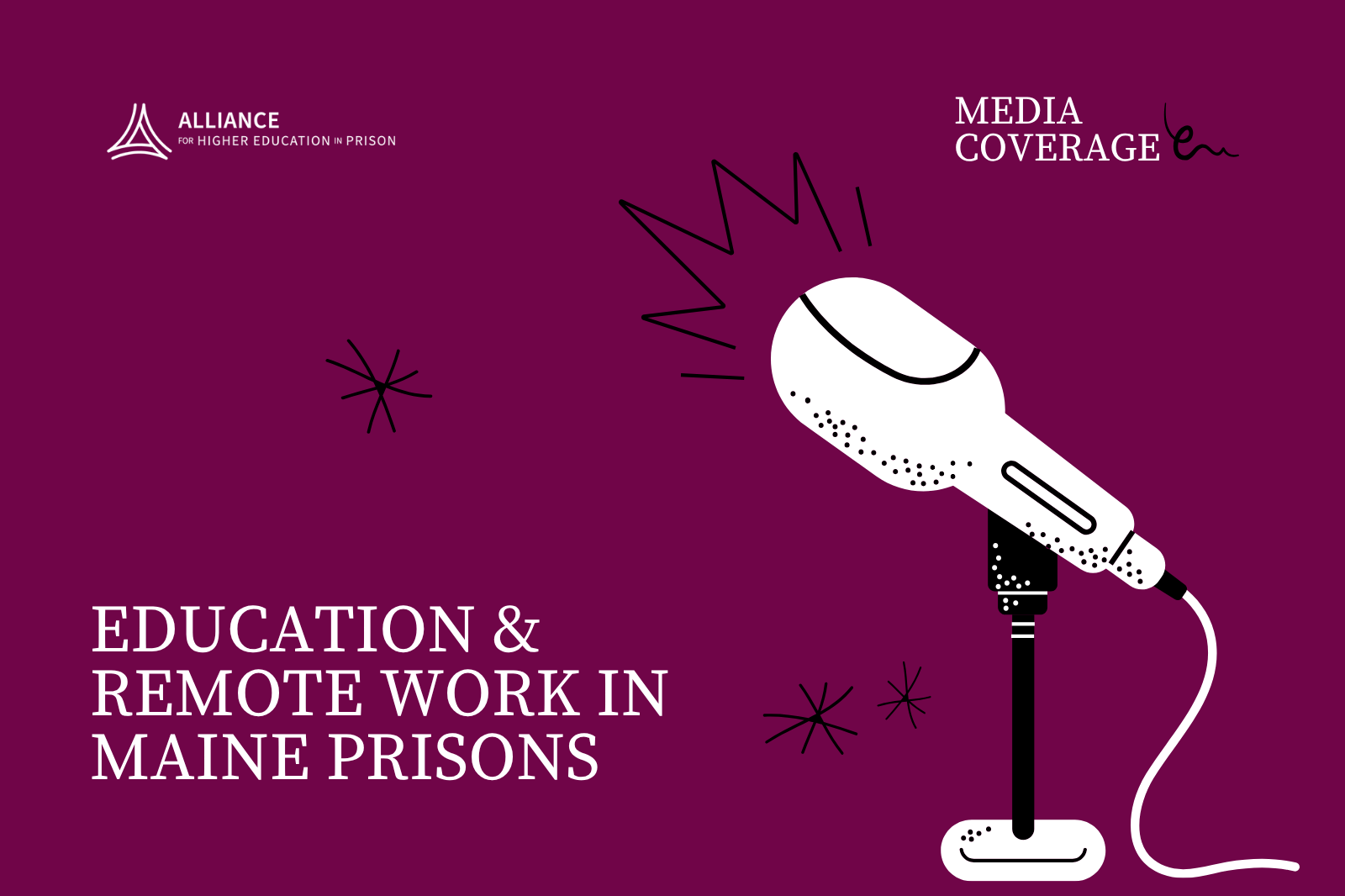
A curated collection of media coverage on education and remote work in Maine prisons, featuring reporting on innovative work-based learning programs, technology access, remote employment, and the Alliance’s contributions to expanding higher education opportunities inside.

A curated collection of media coverage on education and remote work in Maine prisons, featuring reporting on innovative work-based learning programs, technology access, remote employment, and the Alliance’s contributions to expanding higher education opportunities inside.

The project team out of the University of Puget Sound is seeking passionate educators, instructional designers, scholars, and practitioners committed to excellence and equity in higher education in prison (HEP) programs to collaborate on the development of a comprehensive, interactive, living online curriculum for teaching and learning within prison settings. This crucial resource will equip current and future HEP instructors, university partners, and program staff with the specialized pedagogical knowledge, strategies, and cultural competence necessary to foster rigorous, engaging, and supportive learning environments for incarcerated students. To express your interest and receive a detailed outline of next steps, please submit a brief statement of interest (no more than 500 words) outlining your relevant experience and the module(s) you are most interested in contributing to tripfinitytaylor@gmail.com by Friday, December 19th, 2025. The full call is linked.

The project team out of the University of Puget Sound is seeking passionate educators, instructional designers, scholars, and practitioners committed to excellence and equity in higher education in prison (HEP) programs to collaborate on the development of a comprehensive, interactive, living online curriculum for teaching and learning within prison settings. This crucial resource will equip current and future HEP instructors, university partners, and program staff with the specialized pedagogical knowledge, strategies, and cultural competence necessary to foster rigorous, engaging, and supportive learning environments for incarcerated students. To express your interest and receive a detailed outline of next steps, please submit a brief statement of interest (no more than 500 words) outlining your relevant experience and the module(s) you are most interested in contributing to tripfinitytaylor@gmail.com by Friday, December 19th, 2025. The full call is linked.

The Cornell Prison Education Program is pleased to announce a one-day Research Symposium on Higher Education in Prison (HEP), to be held on April 8, 2026 in conjunction with NCHEP 15 in Cleveland, OH. This symposium will bring together researchers, practitioners, and programs engaged in advancing HEP research, developing data collection strategies, and implementing research-informed practices. The event will feature both established scholars and emerging researchers who are piloting innovative HEP studies. Space is limited. If you would like to request more information, please email cpep@cornell.edu. To express interest in participating, please use the linked form.

The Cornell Prison Education Program is pleased to announce a one-day Research Symposium on Higher Education in Prison (HEP), to be held on April 8, 2026 in conjunction with NCHEP 15 in Cleveland, OH. This symposium will bring together researchers, practitioners, and programs engaged in advancing HEP research, developing data collection strategies, and implementing research-informed practices. The event will feature both established scholars and emerging researchers who are piloting innovative HEP studies. Space is limited. If you would like to request more information, please email cpep@cornell.edu. To express interest in participating, please use the linked form.

People who have experienced the justice system firsthand bring invaluable knowledge—whether from representing themselves, helping others as jailhouse lawyers, or navigating complex legal processes. Many have earned paralegal or law degrees and have built meaningful careers in the legal field. Yet, too few legal training and career opportunities exist, and too many barriers stand in the way of system-impacted individuals who aspire to make a difference. Together, we can change this. Ascendium is bringing together people actively engaged in expanding legal training and legal career pathways for system-impacted individuals on April 8, 2026, in conjunction with NCHEP 15. The convening is intended for people with a direct connection to the topic including those who: have served as jailhouse lawyers, earned legal credentials while incarcerated, provide legal training in carceral settings, work on character and fitness and other legal licensure requirements. Please complete the linked interest form by December 12, 2025 if you want to attend or get more information, and please send any questions to legal@ascendiumeducation.org.

People who have experienced the justice system firsthand bring invaluable knowledge—whether from representing themselves, helping others as jailhouse lawyers, or navigating complex legal processes. Many have earned paralegal or law degrees and have built meaningful careers in the legal field. Yet, too few legal training and career opportunities exist, and too many barriers stand in the way of system-impacted individuals who aspire to make a difference. Together, we can change this. Ascendium is bringing together people actively engaged in expanding legal training and legal career pathways for system-impacted individuals on April 8, 2026, in conjunction with NCHEP 15. The convening is intended for people with a direct connection to the topic including those who: have served as jailhouse lawyers, earned legal credentials while incarcerated, provide legal training in carceral settings, work on character and fitness and other legal licensure requirements. Please complete the linked interest form by December 12, 2025 if you want to attend or get more information, and please send any questions to legal@ascendiumeducation.org.
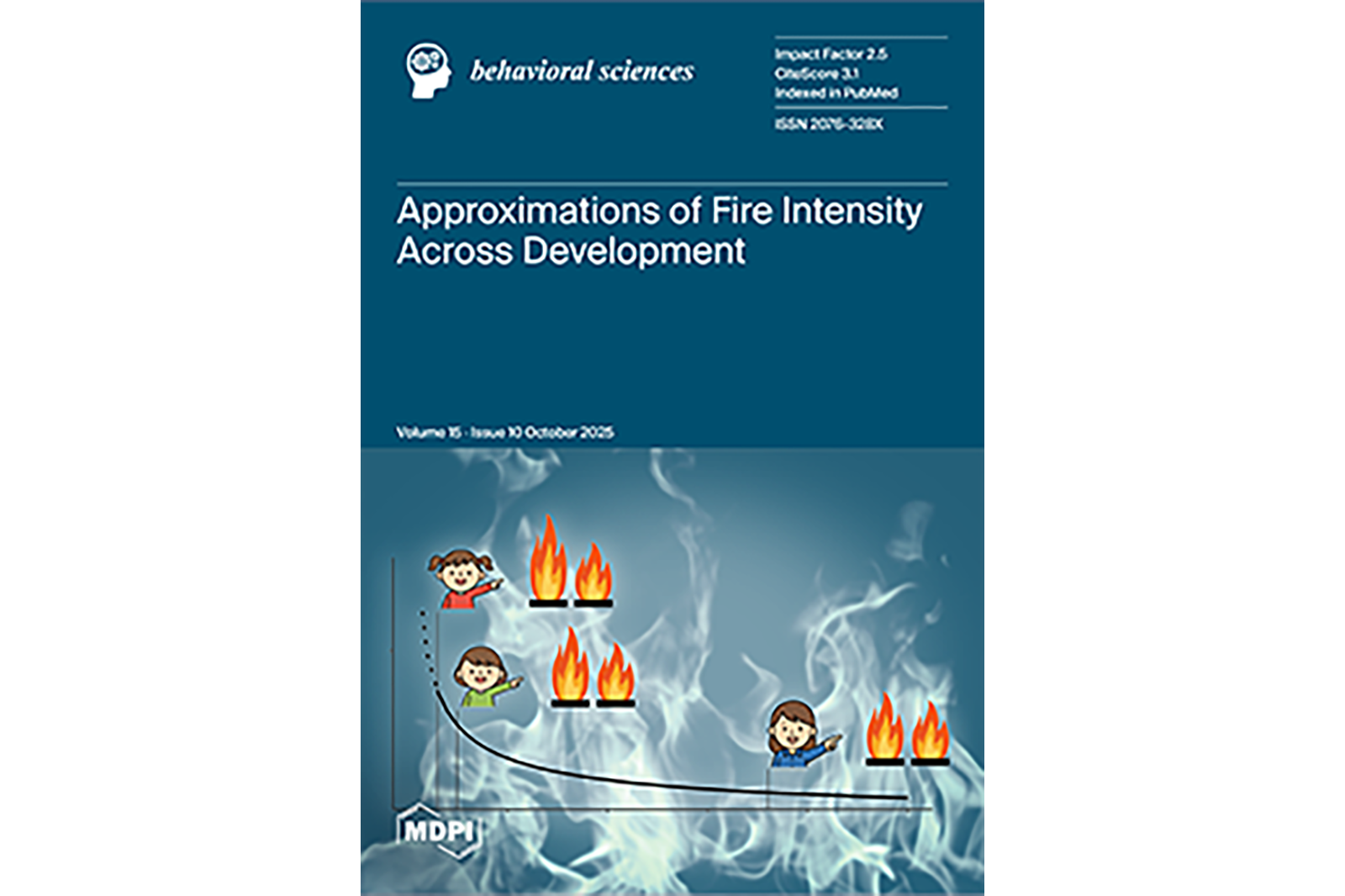
Although Pell Restoration enables an increasing number of colleges and universities to provide higher-education-in-prison (HEP) programs, this funding guarantees nothing about the quality and rigor of programming. In fact, relatively little is known about the nature, scope, and quality of HEP programs within the United States, and it is both timely and important to deeply examine these topics. The present study is a critical qualitative case study of three college-in-prison programs in the southern United States.

Although Pell Restoration enables an increasing number of colleges and universities to provide higher-education-in-prison (HEP) programs, this funding guarantees nothing about the quality and rigor of programming. In fact, relatively little is known about the nature, scope, and quality of HEP programs within the United States, and it is both timely and important to deeply examine these topics. The present study is a critical qualitative case study of three college-in-prison programs in the southern United States.
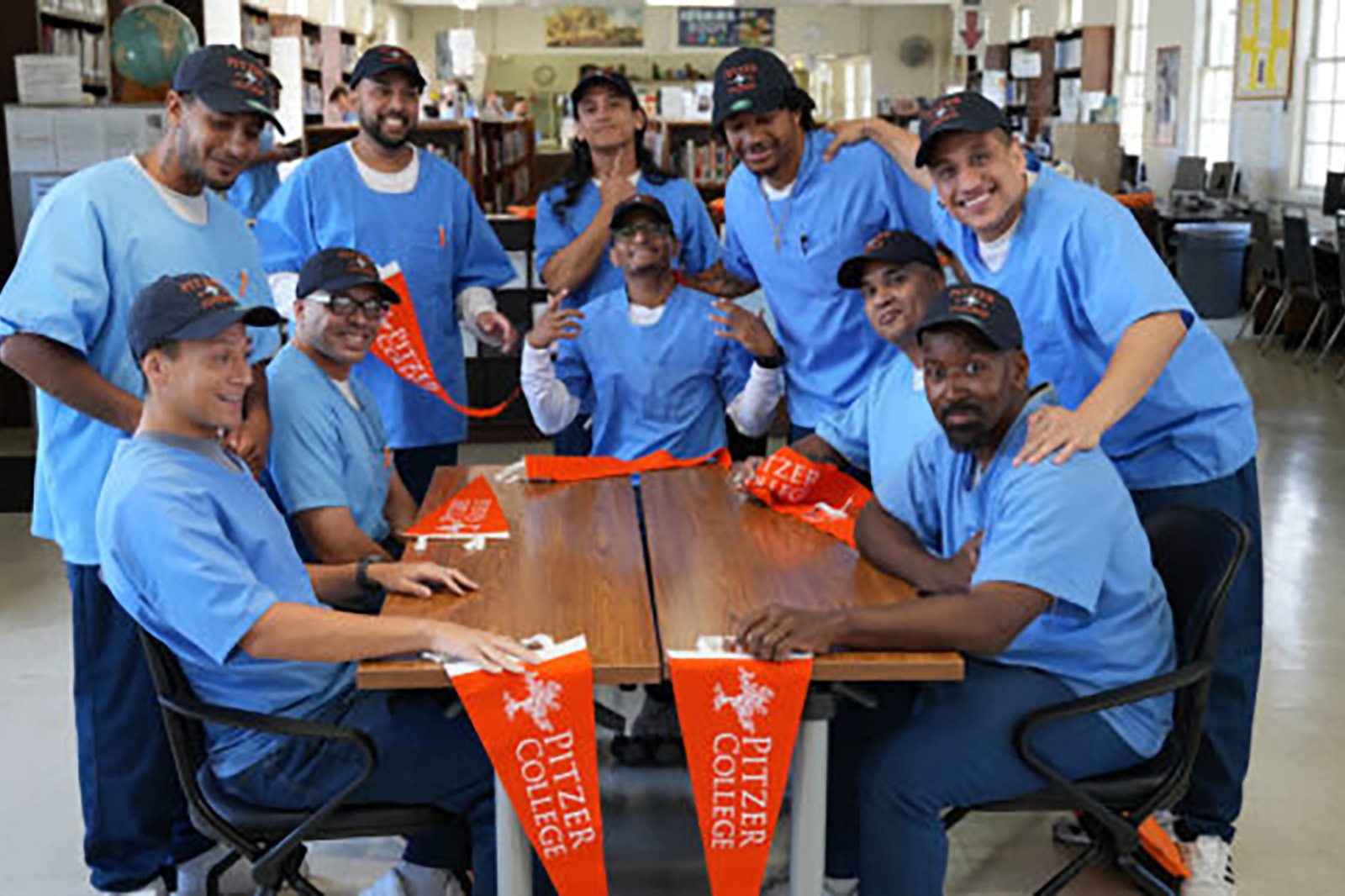
In a classroom with no windows, inside a California prison where the future is often measured by parole dates and time served, a different kind of transformation is taking place. Each week, a group of incarcerated men gather, not to count days, but to ask questions: What is our mission? What are our strengths? What must we leave behind? Their curriculum isn’t designed around punishment or compliance. It’s built on the ideas of Peter Drucker, the father of modern management. At the California Rehabilitation Center in Norco, Drucker’s philosophy has found new relevance in the rehabilitation of people who are redefining what it means to lead.

In a classroom with no windows, inside a California prison where the future is often measured by parole dates and time served, a different kind of transformation is taking place. Each week, a group of incarcerated men gather, not to count days, but to ask questions: What is our mission? What are our strengths? What must we leave behind? Their curriculum isn’t designed around punishment or compliance. It’s built on the ideas of Peter Drucker, the father of modern management. At the California Rehabilitation Center in Norco, Drucker’s philosophy has found new relevance in the rehabilitation of people who are redefining what it means to lead.

As a cornerstone of our Unlocking Economic Mobility for Adult Learners Initiative, College Futures Foundation is excited to launch a competitive grant opportunity in partnership with Jobs for the Future (JFF), aimed at building momentum, elevating innovation, and driving greater outcomes for adult learners across California. Letter of Interest deadline October 24, 2025.

As a cornerstone of our Unlocking Economic Mobility for Adult Learners Initiative, College Futures Foundation is excited to launch a competitive grant opportunity in partnership with Jobs for the Future (JFF), aimed at building momentum, elevating innovation, and driving greater outcomes for adult learners across California. Letter of Interest deadline October 24, 2025.
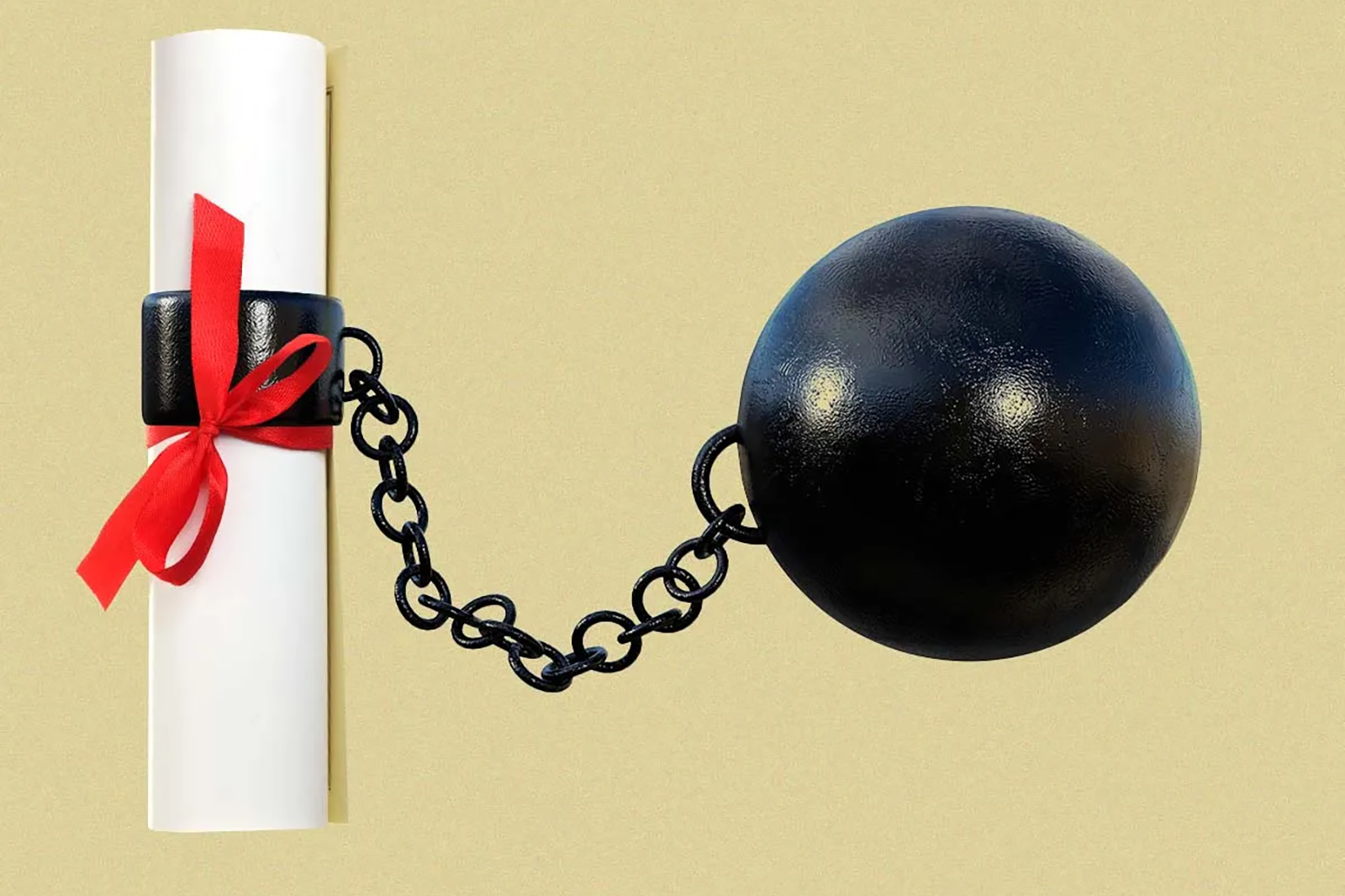
There’s a common misconception that education in prison is free. I’ve heard this from staff at my prison. Some staff have paid for higher education for themselves or their children, or have been priced out of doing so, and they resent the idea that I and my peers are possibly getting free rides. But that sentiment overlooks several key points.

There’s a common misconception that education in prison is free. I’ve heard this from staff at my prison. Some staff have paid for higher education for themselves or their children, or have been priced out of doing so, and they resent the idea that I and my peers are possibly getting free rides. But that sentiment overlooks several key points.

For millions of low-income and first-generation college students, the Pell Grant is more than financial aid; it is a lifeline.

For millions of low-income and first-generation college students, the Pell Grant is more than financial aid; it is a lifeline.